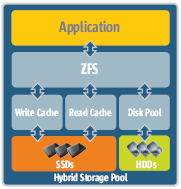Flash disk drives are a hit with enterprise customers, says Sun

Today, Sun announced hundreds of wins across a range of industries for its eco-friendly Sun Storage 7000 series since it was introduced 5 months ago. According to Sun, over 17 petabytes of total space has been purchased, making it "the fastest ramping new product in Sun's storage portfolio ever". Sun also announced hardware capacity enhancements to the Sun Unified Storage family and an upgrade to its administrative analytics software.

ZFS manages DRAM, SSDs, and HHDs in a hybrid storage pool that delivers higher performance at lower cost than traditional storage architectures. In these hybrid storage pools, SSDs are used as a read cache for actively used data, making the entire storage infrastructure appear as fast as flash storage to applications.
ZFS transparently executes writes to the pool of low latency SSD media so that writes can be quickly acknowledged, allowing the application to continue processing. The data is then automatically flushed to hard disk drives as a background task performed by ZFS. Another pool of SSD media acts as a read cache and ZFS also manages the process of copying frequently accessed data into this read cache where it can be retrieved with very low latency.
Web hosting company Media Temple (mt) was an early adopter of the hybrid storage devices. CTO Joshua Barratt writes:
"During our evaluation of the Open Storage 7410, we found that the combination of read and write biased flash storage and disk outperformed systems with four to five times the number of spinning disks (and without any read write flash). We are still evaluating these units for use in a customer facing capacity, but we are definitely going to use these units in a data retention and data processing capacity. The expandability and the analytics capabilities offered by the Sun Storage 7410 units are very enticing to us, and may allow us to make some major changes to the architecture of our storage systems."
For more information, including white papers and free simulators see the Sun Open Storage web page. One of the simulators monitors your workload and estimates how much faster a hybrid SSD system would be, and another sets up a virtual machine with the administration suite installed so you can see how the system works before buying anything.